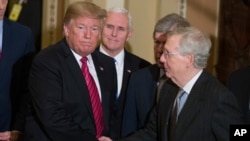For four years, former U.S. President Donald Trump and Senate Republican leader Mitch McConnell were politically joined at the hip, with the lawmaker eagerly advancing Trump’s demands to cuts taxes, curb governmental regulations and install conservative jurists on the Supreme Court and lower courts across the country.
But now, with Trump out of office and McConnell presiding over a Senate Republican minority, not majority, their relationship has plunged into a vitriolic sea of acrimony.
McConnell voted to acquit Trump at the conclusion of last week’s Senate impeachment trial on charges of inciting the Jan. 6 storming of the U.S. Capitol that left five people dead.
But McConnell said he voted in Trump’s favor only because he did not believe the U.S. Constitution allowed for Trump to be convicted on an impeachment charge after he had left office. A Senate majority, 57-43, voted to convict Trump but that was short of the two-thirds majority necessary for a conviction.
Then McConnell unleashed a broadside against the person he thought was singularly responsible for the chaos that threatened the life of former Vice President Mike Pence and the safety of lawmakers: Donald Trump.
"There is no question, none, that President Trump is practically and morally responsible for provoking the events of the day," he said in a floor speech Saturday afternoon, noting that Trump had watched the events unfold on television. "A mob was assaulting the Capitol in his name. These criminals were carrying his banners, hanging his flags and screaming their loyalty to him."
McConnell added, “This was an intensifying crescendo of conspiracy theories orchestrated by an outgoing president who seemed determined to either overturn the voters' decision or else torch our institutions on the way out."
Trump, from his Atlantic coastal mansion where he moved after leaving Washington, responded in kind Tuesday night.
He called McConnell "a dour, sullen, and unsmiling political hack.”
Trump claimed in a statement that if Republican senators retain McConnell as their leader, “they will not win again.”
"He will never do what needs to be done, or what is right for our country,” Trump said of McConnell even though the lawmaker had done Trump’s bidding during his four-year term in the White House.
After his acquittal, Trump said he would engage in shaping the Republican political landscape ahead of the 2022 congressional elections when all 435 members of the House of Representatives are up for reelection along with one third of the 100-member Senate.
“Where necessary and appropriate,” Trump said in his Tuesday statement, “I will back primary rivals who espouse Making America Great Again and our policy of America First. We want brilliant, strong, thoughtful, and compassionate leadership."
It was not immediately clear how such a list of Trump-favored Republican candidates might differ from ones McConnell would support. McConnell says he is most interested in Republican congressional nominees who can win and retake control of both chambers of Congress from the Democrats.
Democrats hold a slight majority in the House and are split 50-50 with Republicans in the Senate. However, Vice President Kamala Harris is able to cast tie-breaking Senate votes in favor of the legislative agenda she and President Joe Biden favor.
The Trump-McConnell split mirrors complaints from state and local Republican groups against House Republican lawmakers who last month voted to impeach Trump on a single charge of incitement of insurrection and against seven Republican senators who joined all 50 Democrats in voting to convict Trump.
Since Saturday’s vote to acquit Trump, several state Republican party groups have censured the Republican lawmakers who voted to convict him.
In turn, the lawmakers said the evidence showed at the five-day trial that Trump was guilty after he urged supporters at a rally near the White House to “fight like hell” to upend Biden’s victory and then sent them marching on the Capitol.




